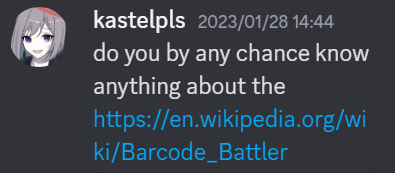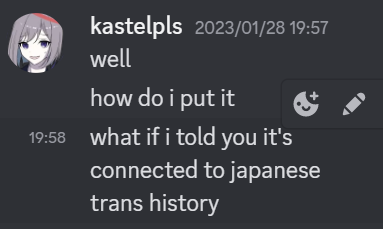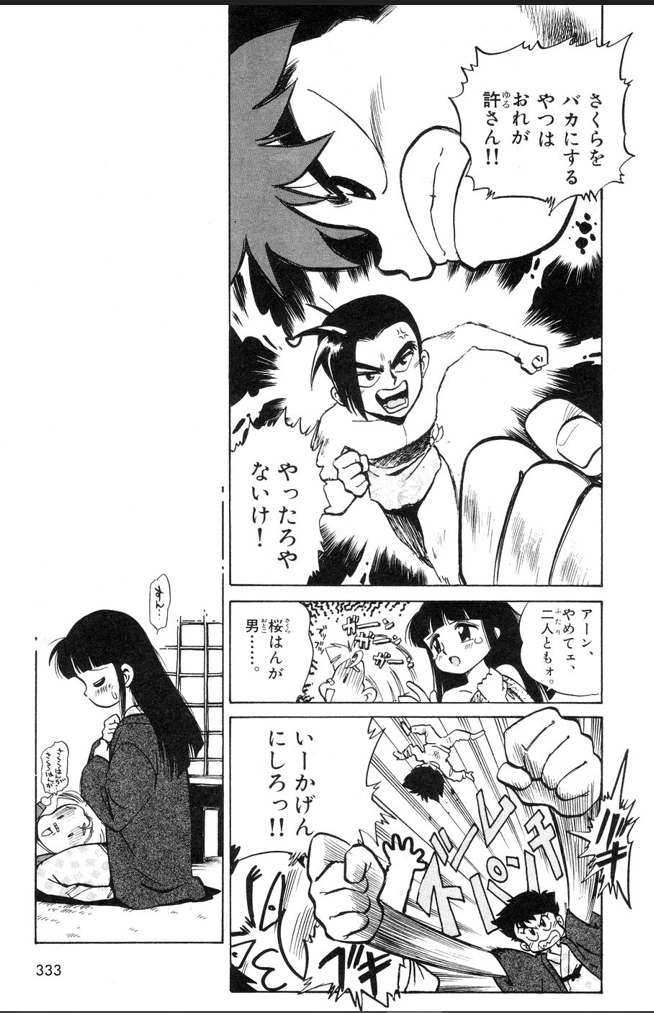-or-how-i-convinced-someone-to-make-a-video-on-a-trans-affirmative-kids-manga-from-the-90s-that-also-has-eromanga-sequel
23 2月 2023


[cw: some sexual references but nothing like overt]
the most important question
once upon a time, @gayanimegirl (saori) and a bunch of us in Prof. Lily, a yuri visual novel collective were wondering a simple question: "Where's all the trans-affirmative otokonoko manga?"
saori was trying to write up a post on OniMai that's now been making the rounds on this site and she read some academic analysis about this shit. specifically, she was looking for papers that explored the otokonoko (roughly femboy but so much more) subcultures and the media associated with them and how they might be connected to exploring gender. however, while she was getting to some good stuff, she didn't find anything dealing with earlier otokonoko manga in english.
it seemed obvious to us that there's not that much english-language media on this content.
so i started looking at the japanese wikipedia article for otokonoko manga. there's some of the more referenced early titles (Osamu Tezuka's Ribbon Knight for example), but the one that really caught my attention: Barcode Fighter.
wtf is a barcode fighter?
encountering a genius
looking up this title on google, i found myself reading nyarla (Needy Girl Overdose writer among an experienced blogger on japanese media subculture) talking about this manga. there, he started talking about how sakura's arguably one of the most famous otokonoko and how it probably traumatized a bunch of kids
but what really caught my attention was the eromanga connections. nyarla wrote about how he lost his mind reading Anal Justice for example when he saw the line that was like "So you were the one leaving cum stains on the wall" in reference to the otokonoko protagonist getting super horny over futa girls doing shit. and the more i read the article, i started to lose my mind when i found out the mangaka, Toshihiro Ono, was also the same mangaka behind Dengeki! Pikachu, a childhood manga for many friends of mine. that manga was also heavily censored by the artist himself for the international releases because it was so fucking horny.
nyarla kept bringing up how the guy's a kind of genius. only a genius would connect a kids' manga about some random console to eromanga doujinshi about futas and otokonokos banging to make a peaceful world. and nyarla also wrote the post in preparation for a sequel one-shot manga that continued the story to let his readers know to get hyped about it. he wanted people to know about this genius. grab the kids' magazine that featured the beyblade protagonist on the cover because this was a one in a lifetime event.
then i read the japanese wikipedia article on Barcode Fighter. and it turns out sakura was more than just a nondescript otokonoko. she's a trans woman. this kids' manga connected to some console nobody but retro nerds ever heard about, the Barcode Battler, has a trans woman character. and there was a critic who talked highly of the manga: "This was a manga that told elementary school boys that it was fine to like otokonoko (read: trans) characters".
okay then, something's definitely up. i hope, readers, you are as curious as i was and going what the fuck is this shit lmao. there's not that many moments where i was seriously rereading the japanese and going "I understand the language, but I still don't understand the concepts". this isn't some eroge with high-minded social science concepts. this is a kid's manga. it was aimed at elementary school students in the 90s and talked about a trans woman character. this is wild.
for context, the lgbt boom in japan was undergoing right now. it's all talk about AIDS and gay rights, not trans people. in the usa, judith butler had published the groundbreaking book Gender Trouble in 1990, two years before Barcode Fighter was first serialized. the mainstream public was trying to grapple with the L and G parts of LGBT, let alone the already "obscure" T. the T was studied by academic sickos who read sicko theorists like butler aka not representative of the public consciousness.
how can a kid's manga talk about trans lives so directly? why does its existence totally confound me?
i had to read the manga myself to find out. i could not believe this 90s manga for kids talked about a trans woman, almost 10 years before Wandering Son came out. that's not really something you hear everyday.
let's barcode
i started reading the manga and thought okay, this seemed interesting. then i hit the first trans affirmative scene and i realized "I Got Something". this was legit. sakura's a legit trans woman talking about trans issues.
I Got Something That Needed to Be Told to Everyone.
i wasn't sure how to proceed. i don't think i could write a post about this by myself. i started being annoyed about the TEXT format that i usually write in. this story about Barcode Fighter needed to be in video format. and i started cursing myself.
and i'd have to research a lot too. i needed someone who i can trust to collaborate and do well to the series. it needed to be someone who can deal with trans issues and adult manga.
it was then i DM'd my good visual novel content creator friend, Amelie Doree, about this: "do you by any chance know anything about the Barcode Battler"?
to which she responded three hours later upon waking up "I know it by name and concept only, it's wild"
amelie doree), for the uninitiated, is a trans video content creator who primarily focuses on visual novels with a queer perspective. she's done some great content over the year and i frequently collaborate on her stuff, providing her translations and some historical context pro bono. i just like helping out.
"well," i said to her, "how do i put this. what if i told you it's connected to japanese trans history?"
i think most people can tell what her response would be to that.
and this was when i started talking about the trans affirmative scene that made me go "okay, i need a collaborator."
in a pivotal chapter, sakura's gender gets revealed to the cast: she's a trans woman. a character named kai who was head over heels for her became disgusted and said she's an okama. the protagonist, retsu, defends sakura and says she's a woman and you should apologize to her.
and both characters start piloting their barcode mechas to fight over trans rights.
we were both losing our shit.
the research
it's not everyday i felt like i uncovered something miraculous from random internet archaeology i did. most times, it's just some dank subculture about clippy-like assistants with elaborate science fiction stories. i enjoy writing about visual novels and their dank themes, but that's to the extent i was willing to write about.
but here, i think we felt like we just found some hidden part of a real LGBTQ+ media history that we were a part of.
so i did some research. i read about how corocoro comics was created in order to house Doraemon, an already popular series of oneshots that was beginning to see some action and become one of the most famous manga of all time. then, i read an interview with the then-current editor who described the philosophy of the magazine as "Peepee Poopoo Fundamentalism".
the way the editor went about goes like this: boys are tired and stressed out from their elementary school work. all they wanna do is chillax and read some manga. and what do boys especially love? piss and poop jokes.
if you read Super Mario-kun for example, that's a manga where mario and luigi make butt jokes as they fight bowser. then, there's the long-running Pocket Monsters manga where all the pokemon talk, clefairy makes fucking weird faces, and charmander found a master ball and stretched it out for the world to see (it was red's scrotum). there's a lot of dick jokes because boys don't give a shit about LOVE like girls do. all they want is funny dick poop jokes and that's it.
if the boys grow out of it and read "older" magazines like shounen jump, that's fine. corocoro won't go after them. instead, the editor said they believe in corocoro's mission: to shower a new generation with peepee and poopoo jokes. and that's why the magazine still lives on to this day.
besides reading this insightful and wise interview, i watched various yukkuri channels on corocoro because all good research begins with reimu telling marisa some obscure lore shit. it was in these videos where i learned about a gag manga about aliens with a heartfelt ending about growing up with a goal to meet your friends, another manga where the protagonist wished for something that made him savestate into a disastrous loop where he keeps experiencing he and his family surviving an airplane crash, and how people read corococo in the showa era. this was all new information to me as someone who barely reads manga, let alone kids' manga.
it was honestly a new world. the research here was very indirect to what made Barcode Fighter special, but it let me immersed myself into the thoughts of what a typical corocoro comics kid would be thinking about.
i still don't get it
by this point, doree was already deep into reading the manga and editing the video. i was advising her on the script and translated a rather long sequence of dialog that would be dubbed in the video. this was the most Effort i've put into a side project that didn't really "serve" me per se but that's just because i care about getting the manga to a bigger and wider public.
but i have to admit i still don't get it.
the more i read into this world of boys' manga, the more i'm stumped how Barcode Fighter existed. this wwas an emotionally mature manga that the creator himself admitted stumbling upon. he originally wanted to make sakura a joke okama character but ended up procrastinating and realizing she was a real character that needed to be treated seriously.
was it all an accident?
it likely is, but when i was working on translating this set of dialog (among my other duties like my ACTUAL JOB), i was fixated on getting these lines right.
the climax of Barcode Fighter happened right before it was cut: in an arc called "Let's Rescue Sakura!". without really giving the game away (i'd rather want people to experience it in the video format that doree made), all i'll say about this scene is about this one line.
there's a scene where kai is able to talk to sakura as a trans woman. he still has a crush on her, but he isn't sure how to transcend the gender binary. remember, these two characters are still kids (single digit ages). especially in the 90s, they don't have access to a vocabulary that we do now. but kai wants to talk about gender to her.
and he says these lines:
だれだって話せないことが一つや二つあるもんや。 ましてや、それがつらい悲しみを引きずっとったら話せなくて当然や。
for those who don't know japanese, let's just say i paced around my room trying to translate this. this is a very emotionally mature thing to say, despite having zero access to the words we have today and it's coming from a kid. here's some kid trying to explain to them that being trans is okay and being unable to talk about it is difficult esp if you got forcibly dragged out of the closet.
i tried translating it previously as something like "i get you closing up like that", "you got dragged out into the open, of course you'd feel bad." but they all sound too sophisticated, too mature, and honestly "too lgbtq+" language. this was the 90s. kids don't know what "being in the closet" means, even if the japanese lines does indicate "dragging out". i stared at these lines for so long because i didn't really understand its function.
and then i realized, he was talking about how vulnerable she was. the reason these lines stayed with me is because he intuits that sakura is feeling vulnerable over her trans identity. he's trying to conceive some Language to approach her and talk about this. i talked with len and ganbarimustang about this and we ended up agreeing with the translation i went for.
i won't spoil what the translation is, but i think people would probably agree with my read on this line. it's a line i am very satisfied with and i would consider it my best translation as an amateur translator to date.
the kicker is that i didn't have to translate this. amelie doree wanted me to translate the stuff after this line. but i didn't want to. i wanted to get this scene translated because it's so damn important. the buildup is too important and that's why the catharsis of the succeeding lines occur. i wanted this line translated by hook or by crook and the solution i found, i hope, makes sense for many people who want to hear trans affirming lines from cis people who don't know what to say to trans people.
i still don't get how this scene happened by the way. it's too absurd to even exist. this is more progressive than any of the 2020s lgbtq content i've read. i fucking love it.
what if as endings

what's tragic about Barcode Fighter is that it ends right after this scene. the manga was cut because the console died to this thing called "Pokemon". no one cared about the console, so why continue the manga?
there is a continuation of sorts, but what really struck a chord with me is about the "lost future" of the manga. much like why i'm obsessed about the Sakura Taisen franchise, i think about how Barcode Fighter could've been something more if it lived longer. what if it got an anime adaptation like all the other corocoro manga? what if kids all over the world got to meet sakura in anime or manga form? what if?
to be quite honest, i don't think strongly about the non-lgbtq parts of the manga. i felt like i'm too jaded and cynical to enjoy the over the top content (I'M TOO MUCH OF AN ADULT). you gotta ask doree about that. but the lgbtq parts relating to sakura really, really impressed upon me. i just think, "What if I read this as a kid?"
i don't talk about my GENDER much publicly because it's hard for me to talk about it. i had voice dysphoria and later became confused about this masculinity thing during my teenage years. i had a deep desire to be some girl. i didn't know what it was until i learned about trans people. and i always thought it was "too late": i only learned about them in college and just "coped".
it was also way later that i learned that people would transition and do HRT at a later age, even at an older age than i am currently. it's "never too late" so to speak, but i also wonder if i would be even happy as a trans woman or if i were straight up born as a woman. i feel like i will always be dissatisfied with my gender expression because we live in some Gender Binary.
which is why i joke about my gender being 闇 (darkness) and my preferred pronouns they/them. i don't think i could ever be happy about my own gender expression in this world. i came to this conclusion a while ago and i've been unsatisfied but at least not feeling like i betrayed my own feelings.
still, i do wonder. what would happen if i read Barcode Fighter as a kid? perhaps, i would still arrive in the same conclusion, but i think i'd be happier knowing there were people out there feeling some similar shit. perhaps, i would realize that i'm nonbinary and shit. perhaps, i could be someone different.
this kids' manga about kids obsessing about barcodes has made me think about the possible Gender Futures i could've led. it's a very strange thing to contemplate on when there's many good lgbtq+ manga out there that goes straight to the source and people feeling like their lives had changed upon reading them.
but here i am, thinking about some kids' manga that could've made an impact on me and so many people if it became anime and was translated when it came out.
conclusion
if you're interested in the actual manga itself, i recommend amelie doree's video (also, an uncensored patreon version exists). it's a good forty minute video with some impressive editing and even voice acting.
if you're coming from doree's side of the equation, uhhh i don't have anything more to add lol.
but i hope this longpost was useful for people interested in this side of LGBTQ+ history. i was very lucky to have found this manga, so i'm doing my best to share my joys over it. i'd like to see more responses to it because sakura and kai are precious characters to me and i want to see people learn about it.
also, anal justice is an incredible eromanga and people should read it. even if it's Problematic to the extreme. it's just funny as shit.